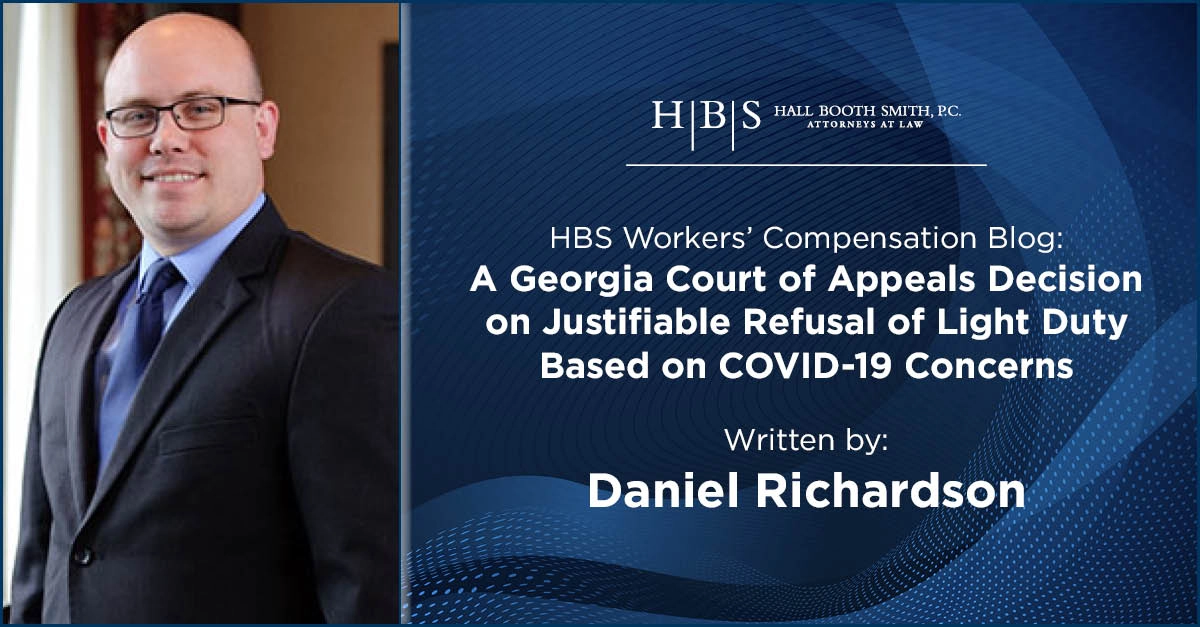
A Georgia Court of Appeals Decision on Justifiable Refusal of Light Duty Based on COVID-19 Concerns
Introduction
On January 31, 2025, the Georgia Court of Appeals decided a workers compensation claim, Taylor v. Argos, USA. The central issue was whether the employee should have been awarded TTD benefits when he refused to return to work in a light duty capacity, and his refusal to return was due to his underlying health issues during the COVID-19 pandemic.
Taylor v. Argos, USA
The claimant, Taylor, was a truck driver who was injured in a traffic accident in 2019. The claim was accepted as compensable. He returned to work in a light duty capacity for about a week with the employer, then was sent to a nonprofit organization to do light duty work. He continued to work with the non-profit up until the time it closed in March 2020 due to the pandemic.
In April 2020, the employer’s counsel emailed the claimant’s counsel that a light duty job was available again with the employer. The employee’s counsel responded that the claimant had diabetes, was afraid to return, and wanted to make sure the employer was taking the necessary precautions to ensure worker safety because he was “high risk.” The employer replied that they were “taking all the necessary precautions to allow their employees” to return safely to work, though apparently no detail was given to the claimant about what those precautions would be. Employer’s counsel emailed again in May stating that there was light duty work available and that the claimant was being put on the schedule. Claimant’s counsel responded: “Mr. Taylor is high risk and has to shelter in place. He is diabetic, and he is 67 years old along with being an African American. He cannot return to work regardless of light duty.” Two days later, the claimant was terminated for job abandonment.
The State Board initially determined that the claimant was unjustified in his refusal to return to work on the basis that his refusal was unrelated to his work injury. However, the Georgia Court of Appeals reversed and awarded the claimant TTD benefits for the period following his termination.
OCGA 34-9-240(a) provides that “[i]f an injured employee refuses employment procured for him or her and suitable to his or her capacity, such employee shall not be entitled to any compensation, except benefits pursuant to Code Section 34-9-263 [PPD], at any time during the continuance of such refusal unless, in the opinion of the board, such refusal was justified.” In applying this statute, there is a two-part test. The first is whether the work offered is suitable to the capacity of the employee. Here, there was no dispute that it was. The second part of the test is whether the employee’s refusal of the work is justified, which was contested in this case.
In its decision, the Court of Appeals cited Wal-Mart Stores, Inc. v. Harris, 234 Ga. App. 401, 402 (1998), to elucidate part two of this analysis: “The discretion afforded the Board under O.C.G.A. 34-9-240 to determine that an employee’s refusal of proffered work is justified must relate to the physical capacity of the employee to perform the job; the employee’s ability or skill to perform the job; or factors such as geographic relocation or travel conditions which would disrupt the employee’s life. An employee’s refusal to accept employment must relate, in some manner, to his physical capacity or his ability to perform the job in order for his refusal to be justified within the meaning of O.C.G.A. 34-9-240.”
The Court of Appeals explained that “there is no requirement that an employee’s refusal to return to work correlate to the work injury in order for the employee to be justified in refusing under OCGA 34-9-240.” There are some examples of reasons for refusal that are justified but that are not specifically related to the claimant’s work accident. For instance, a nurse who refuses a typing job because she lacks the skills to perform it would be justified in refusing the offer of a typing job. An employee would be justified in refusing a job offer that would require relocating her home. This case, Taylor v. Argos, USA, now provides another example in this line of cases where refusal would be justified.
Conclusion
This case underscores the importance of clear, documented safety protocols during extraordinary circumstances like the COVID-19 pandemic. When offering light duty work, employers should provide specific, verifiable details about workplace safety measures, particularly for high-risk employees. Moreover, this decision suggests that refusal to return to work can be justified by broader health concerns beyond the specific work injury. If you have any questions about offers of light duty employment in your situation and whether TTD should commence or be suspended, please feel free to contact us.
Disclaimer
This material is provided for informational purposes only. It is not intended to constitute legal advice nor does it create a client-lawyer relationship between Hall Booth Smith, P.C. and any recipient. Recipients should consult with counsel before taking any actions based on the information contained within this material. This material may be considered attorney advertising in some jurisdictions. Prior results do not guarantee a similar outcome.
Blog Overview
About the Author
Daniel Richardson
Attorney at Law | Atlanta Office
T: 404.954.6954
E: drichardson@hallboothsmith.com
Daniel Richardson practices in a variety of workers’ compensation matters. He has extensive experience evaluating and negotiating complex cases through to resolution and has taken cases to the Supreme Court of Georgia and the Georgia Court of Appeals.




Leave a comment
You must be logged in to post a comment.